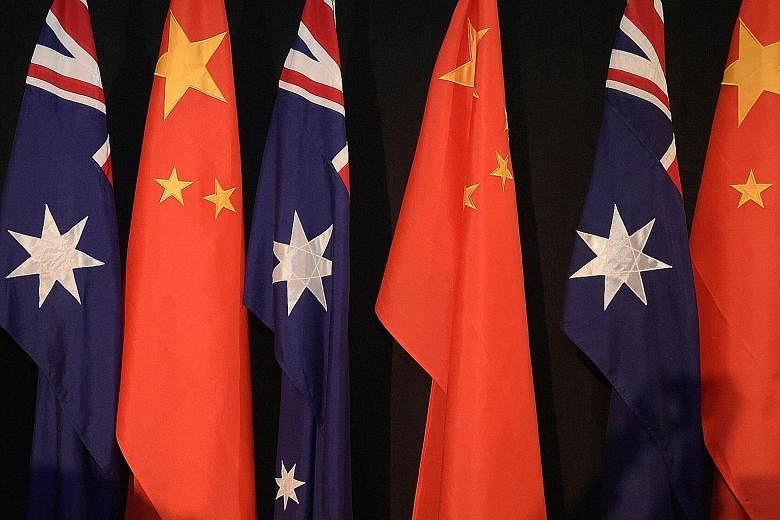China halted a high-level economic dialogue with Australia yesterday amid already strained ties, in a symbolic move to show its displeasure with Canberra for scrapping two Belt and Road deals.
Australia this week also signalled that it will review a controversial lease of Darwin's port to a Chinese-owned company.
A statement by China's economic planner said it was suspending all activities under the China-Australia Strategic Economic Dialogue because of the Australian government's "current attitude" towards bilateral cooperation.
The two sides have not held a meeting under this framework since 2017, when they signed an agreement to cooperate on investment and infrastructure projects in third countries, including for the Belt and Road Initiative. The first meeting was held in 2014.
In its short statement, the National Development and Reform Commission said some Australian officials had "launched a series of measures to disrupt the normal exchanges and cooperation between China and Australia out of Cold War mindset and ideological discrimination". It did not say what these measures were.
Foreign ministry spokesman Wang Wenbin said at a regular briefing later that Australia had "disregarded China's solemn position and repeated representations, and abused the 'national security' reason to restrict and suppress China-Australia cooperation projects". He added: "China has to make the necessary and proper response, and Australia must bear all responsibilities for this."
But China's move was seen as less significant than its curbs and sanctions in the past year on some A$20 billion (S$21 billion) worth of Australian exports.
Australian Trade Minister Dan Tehan expressed disappointment but said Canberra hoped the dialogue can be revived.
"We remain open to holding the dialogue and engaging at the ministerial level," he said in a statement.
Ties between the two countries have been strained since Australia blocked Chinese tech firm Huawei from its 5G network in 2018. They worsened last year when Canberra called for an independent inquiry into the origins of the Covid-19 outbreak, triggering trade sanctions from Beijing on Australian wine, coal and barley in retaliation.
Last month, Canberra tore up the two Belt and Road agreements signed between China and Victoria state, saying it was "inconsistent with Australia's foreign policy". The move drew a rebuke from the Chinese embassy as "unreasonable and provocative".
The dialogue's suspension was expected because of the scrapping of the deals and was meant to send a "strong diplomatic signal" to Canberra, said Ms Yun Jiang, who researches China-Australia ties at the Australian National University.
"But there has been a diplomatic freeze for two years now, so formal ministerial-level dialogue has not happened as scheduled for a while, even before this suspension. This suspension is therefore largely symbolic," said Ms Jiang, who is also managing editor of The China Story, a blog on China issues.
Trade and investment between the two countries can still take place in the absence of dialogue.
"But there could be more economic actions from China against Australia after this," she said.
Some analysts noted that China had suspended - rather than cancelled - the dialogue and had not moved to limit its massive purchases of Australian iron ore.
Dr Jeffrey Wilson, research director at think-tank Perth USAsia Centre, said China had been forced to resort to "largely meaningless acts of symbolism".
"China has run out of ammunition," he said on Twitter. "By going 'thermonuclear' on trade in 2020, they now have no substantive ways to punish Australia anymore, and have to scrap around for impact-free acts of pure symbolism."
The Australian dollar fell after the announcement to a low of 77.01 US cents from Wednesday's 77.47.

